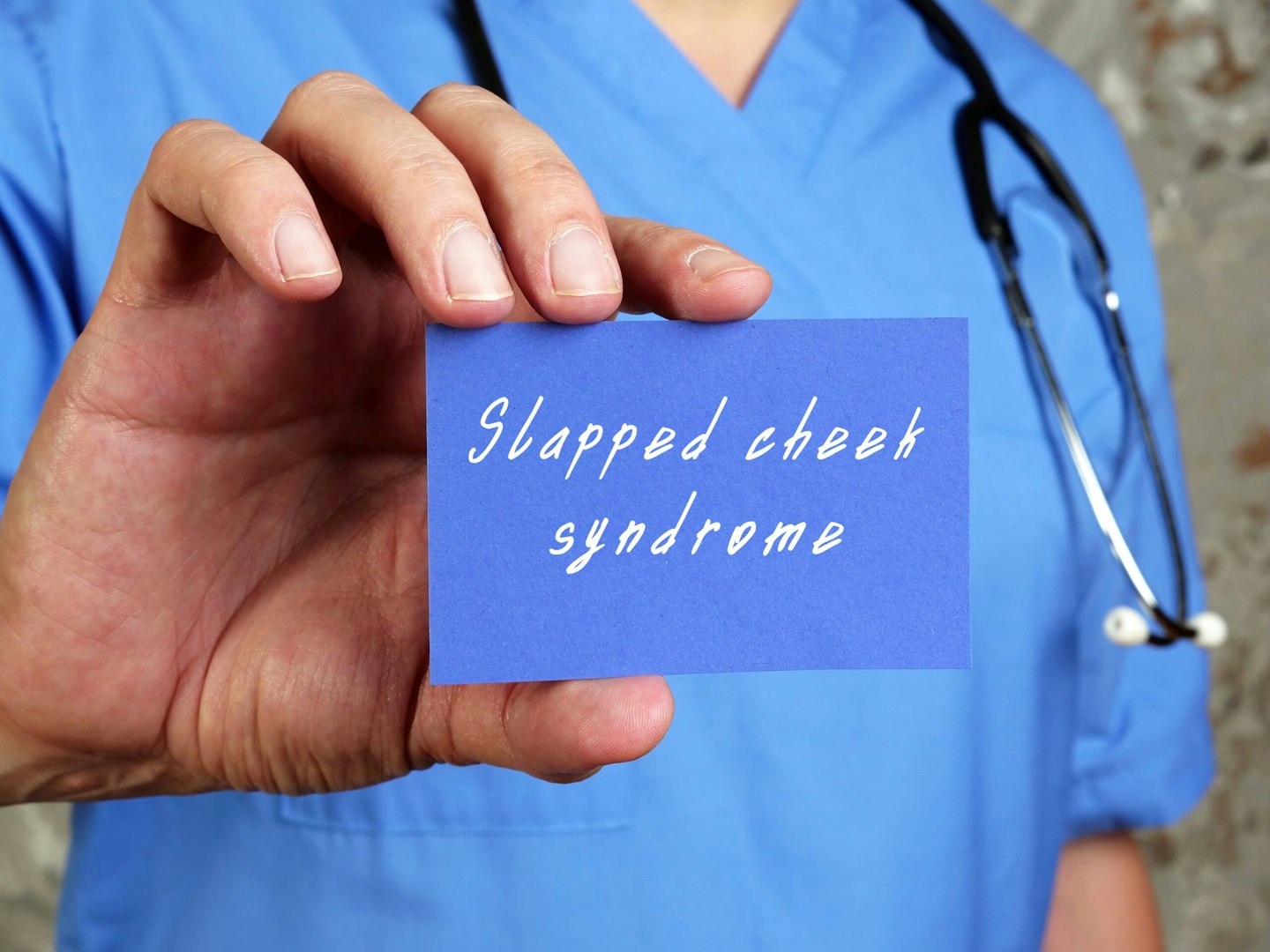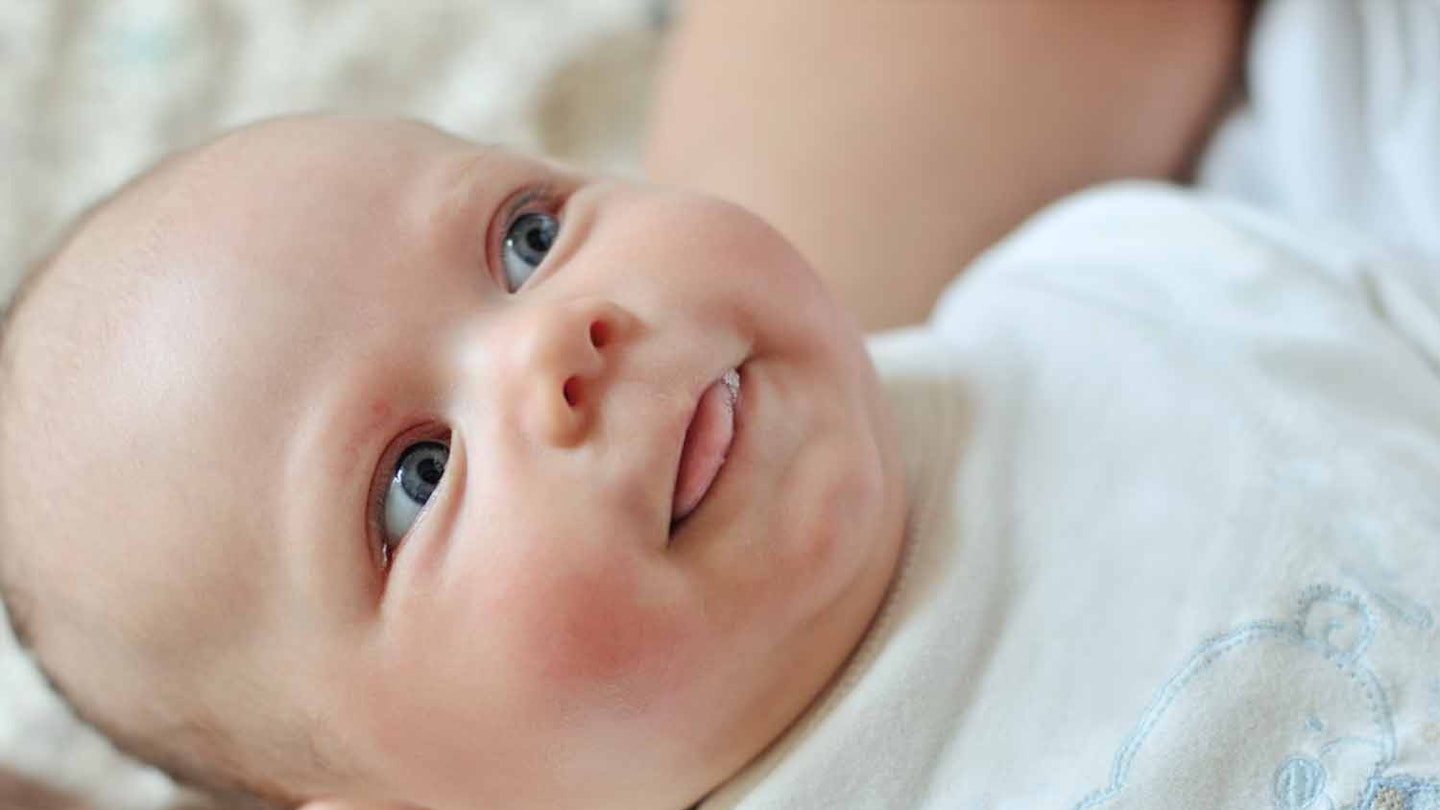Is your little one having baby skin trouble? Rosy cheeks are adorable but if your little one is unusually red all of a sudden they may have what's known as 'slapped cheek syndrome', in the form of a rash. Along with the rash, they may experience other symptoms too.
What is slapped cheek syndrome?
According to Dr Deborah Lee, Dr Fox Online Pharmacy: "Slapped Cheek Syndrome is a viral infection that is common in children and is caused by parvovirus B19. It gets its name as it causes rosy, red cheeks that look like the child has been slapped across both cheeks. The rash is also known by the medical term erythema infectiosum. The condition is also known as Fifth Disease," says Dr. Lee
The virus is spread in respiratory secretions and saliva. It most commonly affects children aged 4-10 years old.
There is a 4-14-day incubation period. Before the rash develops there are often early symptoms such as headache, muscle pains, headache and a low-grade fever.
There are 3 phases of the rash. "In phase one a bright red appearance develops over both cheeks, with the typical ‘slapped’ appearance. In phase two a spotty rash occurs on the trunk, buttocks, arms and legs. The palms and soles are usually spared. In phase three, the rash is disappearing which it does with central sparing creating a lacy pattern on the skin. In 50% of cases, the rash may be itchy," says Dr. Lee.
The diagnosis is made on the clinical signs, although it is possible to have a blood test to look for parvovirus antibodies, but this is not often necessary.
Those with slapped cheek should be treated symptomatically. This means rest, plenty of fluids, paracetamol or ibuprofen (do not give aspirin to children under 16 years old because of the risk of Reye’s syndrome). Use emollients on the skin. Speak to your pharmacist if it is itchy about the most appropriate antihistamine.
The infection will usually subside within 1-3 weeks with complete recovery.
"The only way to prevent slapped cheek is to stay away from anyone you know who has it, plus wash your and your child's hands frequently. There is no vaccine for parvovirus," says Dr.Lee.
Can adults get slap-cheek syndrome?
Adults can get slapped cheek too, although only 20% of adults get the rash on their face. The rash is more likely to be seen on the legs in adults.
Please note that slapped cheek is dangerous in pregnancy as it can cause miscarriage and is associated with anaemia in the unborn fetus. If you are pregnant and have been in contact with slapped cheek you must notify your obstetrician and midwife without delay.
Those at higher risk from parvovirus infection include:
-
Pregnant women
-
Anyone with a weakened immune system
-
If you have a blood disorder such as sickle cell anaemia or thalassemia
-
Anyone with symptoms of anaemia such as extreme pallor, shortness of breath, lack of energy and fainting
If you meet any of these criteria and have been exposed to parvovirus infection, contact your GP or phone NHS 111.
Is slapped cheek syndrome contagious?
Slapped cheek is highly contagious. The virus is passed in droplets from coughing and sneezing and in saliva. It can also be transmitted on the fingers after touching a surface which is contaminated and then putting your hands in your mouth or nose.
"Note that by the time the rash appears, the child is no longer contagious. So, they do not need to be kept away from school or nursery. The infectious period is before the rash develops," says Dr. Lee.
What does slapped cheek syndrome look like?
The rash is said to have a pink, lacy appearance and when you touch it, it is slightly raised. The rash is harder to see on black/brown skin.
You can see a picture here
Can you get slapped cheek syndrome more than once?
No, once you’ve had slapped cheek you develop antibodies that should last a lifetime. "60% of adults have had parvovirus infection by age 30. 20-30% of those infected have no symptoms", says Dr. Lee.

Symptoms of slapped cheek
Some babies will not get any symptoms at all in this first stage. Early on, it is highly contagious and can easily be passed on, but signs may be subtle. Dr Sarah Temple, The Essential Parent Company's expert GP, says that "in around 20-30% of cases, symptoms are so mild they’re barely noticeable."
But the initial symptoms include:
-
Flu-like symptoms
-
Sore throat
-
Headaches
-
Upset tummy
-
Join pain
Can adults get slapped cheek syndrome?
Although it's usually babies and young children that suffer from slapped cheek, adults can get it as well. Although it's less common to experience it outside of childhood, the symptoms can be more serious. Once you've had it once, you are often immune from it and won't have it again in your lifetime, says Dr. Lee.
What are the risks of slapped cheek syndrome during pregnancy?
If you happen to get slapped cheek syndrome yourself and you're pregnant, there is usually no reason to panic, but there are some possible complications. Most women will have healthy babies, but if you get slapped cheek within the first 20 weeks of pregnancy, there is an increased risk of miscarriage. If you become infected during weeks 9 to 20 of your pregnancy, there is a small risk that the baby could develop foetal hydrops. This is more serious, as a build-up of fluid develops in the baby's body, causing possible anaemia or heart failure. It is possible for the baby to recover from, but the condition can be fatal.
There is no evidence that having slapped cheek syndrome during pregnancy causes birth defects or developmental problems later in childhood.
The stages of slapped cheek syndrome:
After a period of 7 to 10 days, a rash appears. The rash occurs in 3 distinct stages, Dr Temple explains.
Stage 1: In the first stage, children develop a bright red rash on both cheeks that usually fades over two to four days.
Stage 2: One to four days after the facial rash appears, a light pink, raised rash that’s a bit itchy, spreads out on the chest, arms, stomach and thighs. By now your little one is probably uncomfortable but no longer contagious.
Stage 3: In some cases, there’s a third stage when the rash fades but reappears over a period of weeks. Re-appearances are often triggered if your child is hot, anxious or has just exercised.
Treatment of slapped cheek syndrome
"Paracetamol or ibuprofen will help with fever and pain while antihistamines reduce the itchiness. A gentle moisturiser might also soothe irritation," says Dr Temple. Pharmacists may recommend an antihistamine for your child if their skin is making them itch.
Otherwise, rest, take it easy and drink plenty of fluids, and babies should continue their normal feeds. The infection should clear up very soon.
It's important that you never give aspirin to a child who's under the age of 16.
If you're worried about any rash on your toddler or child, you should seek medical attention or advice as soon as possible.
Can children with slapped cheek syndrome go to school?
Once the rash appears, they are no longer contagious so you don't need to keep them off of school, nursery or the childminders'. Just let the teacher or whoever's looking after to them know either before or when you drop them off, so they know why they have the rash and to look out for any signs of them feeling unwell.
Do I need to see a GP?
If your baby has slapped cheek, in most cases, it will be a mild infection that clears up on its own. If you are worried, you should speak to your GP – especially if your child has any known blood abnormalities (such as sickle cell anaemia) or is immunosuppressed.
They should be able to diagnose the syndrome quite quickly (due to the distinct look of the visible rash), but they may also do a blood test to see if you have recently had the parvovirus or if you have any immunity to it.
If you are pregnant and catch slapped cheek syndrome, consult your midwife or GP to prevent further complications from arising.
Meet the expert
Having worked for many years in the NHS, mostly as Lead Clinician within an integrated Community Sexual Health Service, Dr Deborah Lee now works as a health and medical writer, with an emphasis on women's health, including medical content for Dr Fox pharmacy. She has published several books and remains passionate about all aspects of medicine and sexual health. After completing her Medical Degree at University of Southampton Medical School in 1986, Dr Lee trained as a GP and after a number of years specialised in Sexual & Reproductive Health (S&RH).
